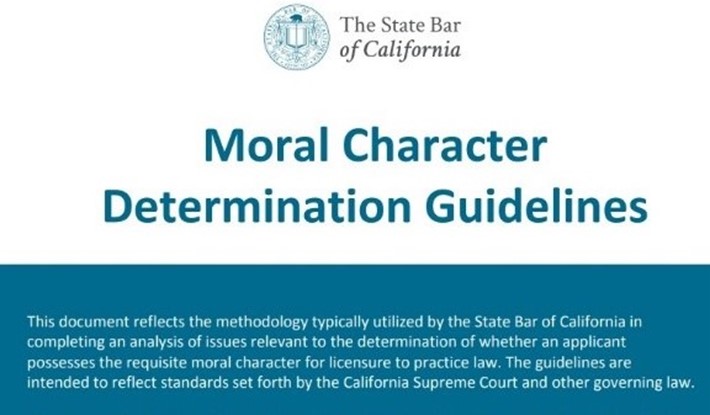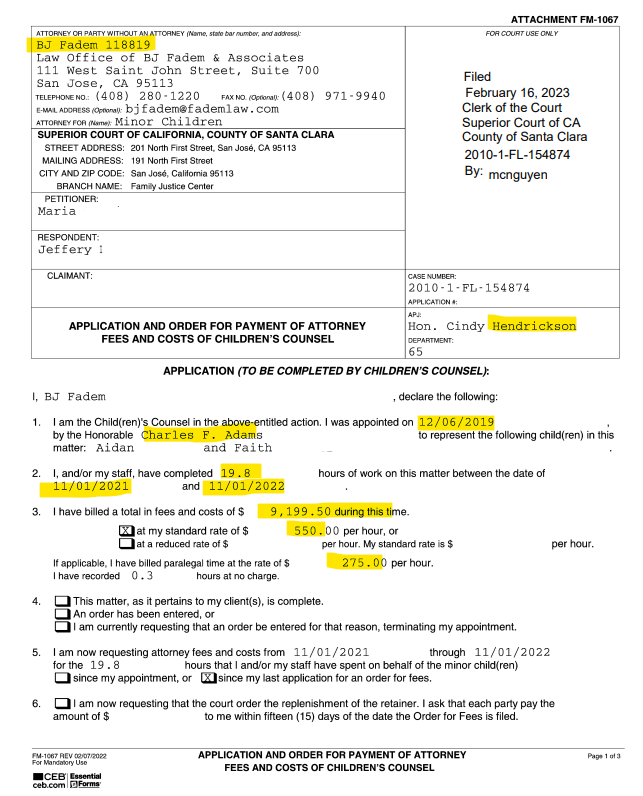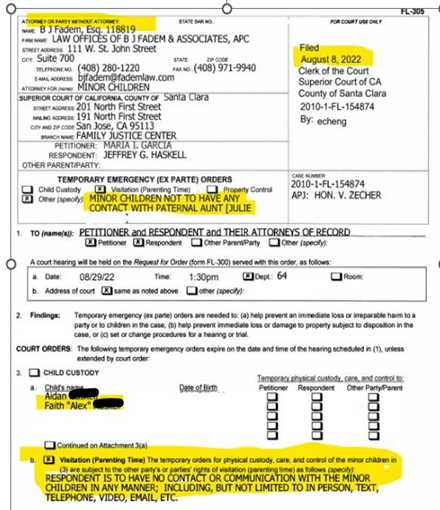

By Susan Bassi, Fred Johnson and Habri Ruggeri
When her lover attempted to end their brief sexual relationship, Sue Saign tried to run him down with her car. She was arrested for assault with a deadly weapon, criminally prosecuted, then convicted of domestic violence. Four years later, in 2010, Saign’s criminal conviction precluded her from working in California as a teacher. So, she went to law school.

Three years before she became a licensed attorney, Saign was defending a civil domestic violence claim brought by her father. That case was sent to mediation with the condition that Saign stay away from her dad until the mediation was completed.

In 2015 Saign passed the bar exam, and the State Bar of California’s moral character test, which includes respect for and obedience to the law, and became a licensed attorney.

Two years into her practice, Saign was approved by Santa Clara County Superior Court to for appointment by family court judges to represent children as “minors counsel.” The designation gave Saign the job of representing children whose parents were going through a divorce, bringing her law firm a robust, thriving, and lucrative business.
Ironically, Saign has recently been appointed as minors counsel by two judges, Stuart Scott and Stephen Lowney, who previously worked in the district attorney’s office at the time Saign was criminally prosecuted in her 2006 domestic violence case.

Minors Counsel Inflating Costs to Parents and Families
In early 2017, Saign hired a third-year law student as a paid intern. The intern was an exemplary employee who received glowing reviews, generous bonuses, gifts, and thank you notes from Saign and her law firm staff. But Saign soon turned on her exemplary employee.

Ten months into her employment, Saign asked the intern to inflate her minors counsel bills by charging parents the higher attorney rate for work done by the intern. The bookkeeping change, billing the attorney hourly rate of $400 versus the $100 intern rate, would have significantly inflated the bills charged to parents or taxpayers for Saign’s services as minors counsel.

When the intern refused, Saign issued “review” and reprimand letters, seeking to deflect her own wrongdoing. The letters were followed by a suspension and soon thereafter, a civil harassment lawsuit.
Civil Harassment Lawsuits Designed to Silence Whistleblowers
Saign and her mother-in-law, Kathy Sardella, claimed their intern was so abusive that they needed protection in the form of a restraining order. A restraining order that stood to prohibit the intern from owning guns, and that posed a threat to her future as an attorney.
Nowhere in the 2017 civil harassment case Saign brought against her intern was Saign’s criminal domestic violence case, or a 2012 civil domestic violence claim made by her elderly indigent father ever raised.
Saign’s intern who could have used the information to assist in her defense, claimed her former boss’ civil harassment case was “frivolous,” “vexatious litigation” and retaliatory. It cost her $10,000 to defend as a law student.

Unethical and Abusive Children’s Attorneys Keep Secrets from Parents
When parents are divorcing or involved in a custody dispute, California has a law that allows a family court judge to appoint an attorney to represent their children. Attorneys, known as minors counsel, are assigned to cases and become the children’s attorneys.
In these cases, there can end up being three attorneys, one for the mother, one for the father, and one for the children. In fact, parents are often startled if not shocked when they receive a letter from the attorney for their children that says:
“As [your child’s] attorney, I have a confidential and privileged relationship with her. I trust that you will ensure that [your child] is given complete privacy when I speak with her, whether it is at either of your homes or anywhere else. You are not to listen in on our conversations, nor ask [your child] anything about what we discussed. Suppose either of you attempts to infringe on the privileged and confidential communications I have with [your child] by listening in on our audio or video calls or questioning her about our discissions. In that case, I may bring the matter before the court and request sanctions against you.
In contrast to [your child’s] relationship, I do not have any contractual relationship with either of you or represent your interests. Anything that either of you discuss with me is not confidential or privileged. I can disclose all our communications to [ your child] or the court at any time.”
Although the minor’s counsel system in California was established with good intentions, it has not had effective oversight, and some ethically challenged lawyers have taken advantage. Divorcing parents report, and court records confirm, that in many cases minors counsel can be indifferent, incompetent, or corrupt such that their involvement in the case results in protracted and costly litigation.
This article highlights two controversial Silicon Valley attorneys who act as minors counsel, representing children in family court where they are paid by the children’s parents or by taxpayers.
Sue Saign has been representing children since 2016. She is not required to tell parents of the children she represents about her violent and abusive criminal history. Nor is she required to reveal allegations made by a former employee about her willingness to inflate her minors counsel bills.
BJ Fadem is a controversial attorney known for his legal-political activism. He has represented children in their parents’ divorce and custody disputes since 2004. Presently, Fadem is minors counsel in a case where he influenced Santa Clara Superior Court Judge Vanessa Zecher to alter the name, sexual identity and pronouns of a little girl, Faith, as Fadem charged taxpayers thousands of dollars. Fadem has not been required to disclose to parents that he is transgender.
Judge Zecher retired from the court on February 29, 2024.

Secrecy and Lack of Training Creates Concerns for Parents
Unlike doctors who typically have someone else in an examination room when they meet with young children, lawyers are allowed to meet with children in secret and not tell parents what was said.
Minors counsel assignments are very secretive, which parents claim is highly problematic. Minors counsel attorneys can influence children without consent or parental oversight.
To qualify as minors counsel, attorneys must take 12 hours of education approved by lawyers, carry malpractice insurance and fill out some administrative paperwork.

Minors counsel are not mandated reporters. If they become aware their young clients are being abused, they are not required to report it to parents, the court, or law enforcement.
By comparison, according to the American Red Cross lifeguard training is designed to assure trainees have skills necessary to promote water safety, prevent accidents and injury, while also learning crucial response techniques in the event of a water emergency. Lifeguards are trained to save lives.
If they learn of abuse, in or out of the water, they are required to report it to police as mandated reporters.
To qualify to be a lifeguard in California, candidates must be qualified swimmers and must submit to 25 hours and 20 minutes of in- person training. They are tested to confirm competency. Once they are qualified, lifeguards make on average $14-27 per hour, according to Indeed.com.
 Attorneys Allowed to Strip Wealth from Parents and Kids
Attorneys Allowed to Strip Wealth from Parents and Kids
Once a judge appoints a minors counsel, the judge must determine how a minors counsel will be paid. If parents are middle class or have substantial income, a judge will order the parents to pay the attorney at their requested rate. Private pay minors counsel rates run $350- 1200 per hour.
When the parents are poor, the minors counsel is paid by taxpayers at a rate determined by each county, typically $75- 100 per hour. However, publicly paid lawyers charge taxpayers $275 per hour for a paralegal and other expenses that inflate minors counsel bills.

Judges are required to review minors counsel bills to ensure they are not overcharging parents or taxpayers, but rarely do.

Minors Counsel and Malpractice Insurance
When a child represented by minors counsel turns 18, the attorney is laid off, fired. However, the debt incurred by parents may continue to linger even after the child at the center of a divorce is an adult.
Attorneys representing children do not have retainer agreements signed by their child clients. Thus, when children reach adulthood, they may have claims of malpractice against the attorneys who represented them during their parents’ divorce as minors counsel.
Such claims typically must be filed within a year of a child turning 18.
Because children can’t consent to retainer agreements that contain arbitration clauses, a malpractice case involving an attorney who acted as minors counsel, would proceed in open and public court.

Attorneys acting as minors counsel are required to carry malpractice insurance. Therefore, children may be able to obtain legal wins that could assist them with future costs for higher education and housing. Wins that may be covered by malpractice insurance.
Minors counsel are known to collect their fees through predatory practices that include wage garnishment or placing liens on the homes of their young client’s parents.

Retaliation in Family Court
Parents regularly complain they lose custody time or face financial sanctions if they complain about a minors counsel’s conduct, or excessive fees and costs they bill.
Court files also show minors counsel are prone to retaliate in family law cases if parents file complaints with the state bar or post complaints on social media and online websites such as Yelp.com.
Once aware of the complaints, minors counsel is known to claim one parent is “threatening”, “abusive” or “mentally unstable”, which often results in legal losses, financial sanctions and increased harm to children and their parents who try to complain.

The best example of retaliation involves minors counsel BJ Fadem and his young clients, Faith and her big brother.
Minors Counsel Used Family Court to Change an 11-Year-Old Daughter to a Boy
On August 7, 2021, without puberty blockers, medical doctors, psychiatrist reports, surgery or information from a teacher or counselor, BJ Fadem told Judge Vanessa Zecher that Faith, an 11-year-old girl, wanted to be a boy named “Alex.”
Judge Zecher ordered Faith’s father, not her mother, to refer to his daughter as “Alex” and to use male pronouns when meeting with her in “reunification” therapy with Marcia Clark, at a cost to father of $300 per hour. Clark came into the case in 2019, six months before BJ Fadem was appointed as minors counsel.
By late 2021, Faith’s aunt began to complain in-person and online about Clark’s bills, and the harm she perceived Clark and Fadem had caused to her brother, his children and her elderly mother. Faith’s grandma has missed the grandchildren she had lived with and helped raise during a decade long divorce, until Clark and Fadem were brought into the case in 2019.
“Without puberty blockers, hormones, assistance of a medical doctor or psychiatrist, BJ Fadem and a family court judge ordered a father to call his daughter by male pronouns and to not question the order.”
After Fadem’s announcement that Faith wanted to be a boy, family court litigation escalated, and Clark’s fees skyrocketed.
Faith’s aunt complained on social media about the emotional and financial toll family court had on her brother, her elderly mother, as well as her niece and nephew.
Retaliatory Civil Harassment Lawsuits and the First Amendment
Just as Saign had done with her intern, on June 30, 2022, Fadem filed a civil harassment lawsuit against Faith’s aunt. The lawsuit alleged Faith’s aunt’s social media posts and online activity was “harassing”, and “abusive”. Fadem claimed the posts disturbed his mental peace.
Fadem asked the court to restrain his client’s aunt from posting on social media and attending hearings where he was involved as a lawyer.
At a March 11, 2024, trial in the lawsuit, Judge Nishigaya said that posting on social media and attending public court hearings in person, or online, was First Amendment protected activity.

Waiting to for His Day in Court
Faith’s father has been sitting in the Santa Clara County jail, without bail, for two years after Clark told Campbell police Faith’s father had attempted to kill her on July 29, 2022. A month after Fadem filed the civil harassment lawsuit and refused to remove himself from representing Faith and her big brother.
Despite being incarcerated for two years; Faith’s father has declined to accept numerous plea deals offered by the Santa Clara County District Attorney.
He is determined to tell a jury what Clark, Fadem and the family court has done to him, his children, his sister and his elderly mother.

Grandma On TikTok Returns Faith to Family Court
For the two years that Faith’s father has been in jail, he refused to allow his 87-year-old mother to visit. Then in late February 2024, a TikTok account emerged showing Faith as a young woman using the name “Faith” with female pronouns, “she”, “her” and “hers”.
The Vanguard sent copies of the TikTok account to BJ Fadem, asking if he intended to correct the family court record since Faith did not appear to be a boy, or using male pronouns. Fadem did not respond.
The day after the inquiry, the social media account was taken down.

Restoring Faith in Family Court
In late February, Faith’s 87-year-old grandma traveled to the jail with her daughter to visit her son. During their visit Faith’s aunt showed her brother copies of Faith’s TikTok account.
After studying the images and noting Faith’s name on the account, her father’s eyes swelled with tears before he said, “she is so beautiful,” adding, “and she is not a boy.”
This is part of a multi- part investigating series reporting on the use of attorneys assigned to represent children in their parents’ divorce and custody cases. To support this work, or provide information about a minors counsel case, please contact the Davis Vanguard, or contact Susan Bassi via email or US Mail: P.O. Box 2220 Los Gatos, CA 95031.